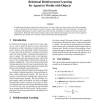Free Online Productivity Tools
i2Speak
i2Symbol
i2OCR
iTex2Img
iWeb2Print
iWeb2Shot
i2Type
iPdf2Split
iPdf2Merge
i2Bopomofo
i2Arabic
i2Style
i2Image
i2PDF
iLatex2Rtf
Sci2ools
135
click to vote
AAMAS
2002
Springer
2002
Springer
Relational Reinforcement Learning for Agents in Worlds with Objects
In reinforcement learning, an agent tries to learn a policy, i.e., how to select an action in a given state of the environment, so that it maximizes the total amount of reward it receives when interacting with the environment. We argue that a relational representation of states is natural and useful when the environment is complex and involves many interrelated objects. Relational reinforcement learning works on such relational representations and can be used to approach problems that are currently out of reach for classical reinforcement learning approaches.
AAMAS 2002 | Intelligent Agents | Interrelated Objects | Reinforcement | Relational Representations |
Related Content
| Added | 16 Dec 2010 |
| Updated | 16 Dec 2010 |
| Type | Journal |
| Year | 2002 |
| Where | AAMAS |
| Authors | Saso Dzeroski |
Comments (0)

